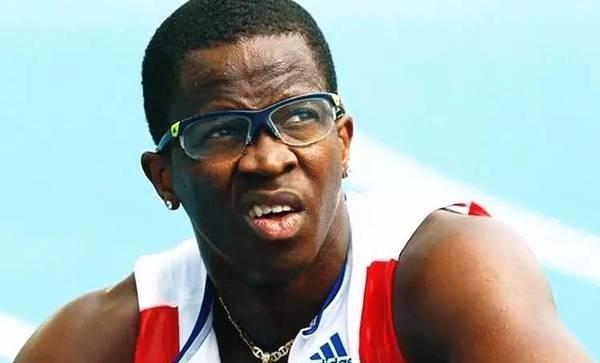At the 2004 Athens Olympic Games, Chinese track and field athlete Liu Xiang won the 110-meter hurdles event, and the name has become famous around the world. Liu Xiang's victory was of great significance, opening up a new situation for Asian athletics and becoming a veritable leader. However, Liu Xiang's opponent is not weak, of which the Cuban young player Robles is Liu Xiang's biggest competitor, this player has a lot of stories, Spark Brother and everyone to talk today.

Because Chinese sports fans pay attention to Liu Xiang, Robles naturally pays attention to Chinese. Robles, whose full name is Dairon Robles, was born in 1986 on the island of Youth, Cuba, three years younger than Liu Xiang. Roberts' father was a volleyball player, and his mother also practiced volleyball. The best performer was his uncle, who in the 400m hurdles in the 70s, Robbs' uncle once ran 51.76 seconds. Given his good family genes, Robles has been a sportsman since he was a child.
Robles began practicing athletics at the age of 10, his favorite was the high jump, and he didn't start practicing hurdles until he was 14. In 2002, at the age of 16, Robles joined the Cuban youth team. At the 2004 World Youth Championships in Italy, he won the silver medal. This year, Liu Xiang successfully hit the championship at the Athens Olympic Games.
Starting in 2006, Robles entered the adult race and ran 8 times into 13.20 seconds, a year in which he improved very quickly and gradually ranked first in the world. In 2007, Robles became Liu Xiang's number one rival. In the Competition of the Golden League in Paris, he defeated Liu Xiang in one fell swoop to win the championship, and in the following matches, he was in a surprisingly good state, taking the gold medal like a probe.
At the 2008 Beijing Olympics, Robles ushered in the highlight of his career, when he first broke Liu Xiang's world record of 12.88 seconds at the Athletics Grand Prix in Ostrava, Czech Republic, with a time of 12.87 seconds. In the following Olympic games, in the case of Liu Xiang's withdrawal due to injury, Robles easily won the Olympic championship. Many people think that in fact, even if Liu Xiang does not withdraw from the Olympic Games, he is not Robles' opponent, but many people believe that 2008 is Liu Xiang's peak period, if Liu Xiang does not withdraw, Robles absolutely has no chance.
Robles has always been a fan of Liu Xiang, he treasured photos with Liu Xiang, and said in front of the media: "Every time I compete with Liu Xiang, I can inspire the best state, Liu Xiang has an unforgettable charm, I hope that I can be as great as him one day!" ”
After Beijing, In 2009, Robles was in very good shape, almost blocking the killing of the Buddha, and from June 10 to August 1 of that year, in less than two months, he won a staggering ten consecutive victories. What followed, however, was the tragedy that Robbs suffered the worst injury of his career and had to recuperate for a long time.
In 2011, in the final of the men's 110m hurdles at the World Championships in Daegu, South Korea, Robles met his old rival Liu Xiang, and a dramatic scene occurred in the competition, in which Robles' arm hit Liu Xiang's arm, which directly caused Liu Xiang to slow down, and finally watched As Robles and the United States' Richardson crossed the finish line, while Liu Xiang only finished third. In the end, Robles' results were canceled, and Liu Xiang was runner-up. In this competition, Robles's behavior made his image in China plummet.
After Robbs experienced the thug incident with Liu Xiang, it actually foreshadowed his beginning to decline. At the 2012 London Olympics, Liu Xiang first withdrew due to injury, while Robles also only crossed 6 hurdles before abandoning the tournament due to injury. The Olympics directly announced the end of the careers of two generations of hurdle trapezers. After Robbes returned to China, he did not expect that the country was very cold to him, the local officials had a bad attitude, he did not get the attention he deserved, and even a decent place for healing could not be found.
In 2013, at the age of 26, Robles reluctantly announced his retirement, saying that he was not because of money problems, but because of the cold of the world.